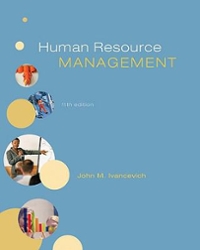Anyone who has tried to balance his or her time between a busy job and a fulfilling
Question:
Anyone who has tried to balance his or her time between a busy job and a fulfilling personal life knows how challenging a work-life balance can be. An indisputable fact is that work and personal lives are interconnected. Companies know this. Potential recruits also know this. It's become more of an issue in recent years due to some important demographic changes that are affecting many workers. For example, companies are experiencing rising demand for the expansion of child care and elder care programs. This is not surprising given the aging of the U.S. population and that Gen Xers are starting to have families. Thus, many recruits who are members of the "sandwich generation" (i.e., they are sandwiched between elderly parents and young children and therefore have to provide care for both sets of family members) consider as part of their employment decisions the number and type of work-life balance programs that potential employers offer. Other demographic changes that are contributing to this rise in the demand for work-life balance programs include the increase of single parents entering the workforce and an increase of dual-career couples. In both cases, parents who shoulder caregiving responsibilities often seek flexible work arrangements and more flexible career cycles. Flexible career cycles allow individuals to leave their career tracks temporarily to raise a child, care for a sick parent, and so on. These individuals are welcomed back to work and placed back into career-oriented positions.
Are companies using work-life balance programs to attract top candidates to join their firms? The answer is yes. Whirlpool attempts to attract recruits with the company's family friendly culture. To illustrate, the company arranged for housing for an intern and his family for the entire summer.
At Xerox, two executives successfully share one job so that they can have more time at home with their young children. After 10 years, the job-sharing arrangement is working whereby both executives report high levels of satisfaction with the arrangement, and the company has been able to retain two productive and experienced employees.
Flextime programs that allow employees limited control over which days and hours they have to be working at the office are becoming popular at many companies. For example, an employee may prefer to work a 4-day/10-hour-a-day week instead of a traditional 5-day/8-hour-a-day week. The shorter workweek may allow the employee to attend children's sporting events, provide weekend care for an elderly parent, or engage in other important activities. Companies such as Hewlett-Packard, Merrill Lynch, Deloitte Touche, and Cigna have implemented flextime programs.
Questions
1. Why is there a need for companies to offer work–family balance programs such as flextime, telecommuting, and job sharing?
2. Of the three programs discussed above, which would be the most important program for you personally when deciding whether or not to join an employer? Why?
3. Some organizations do not believe in offering any of these work-life balance programs. What do you think their reasoning is? Explain.
Step by Step Answer:






